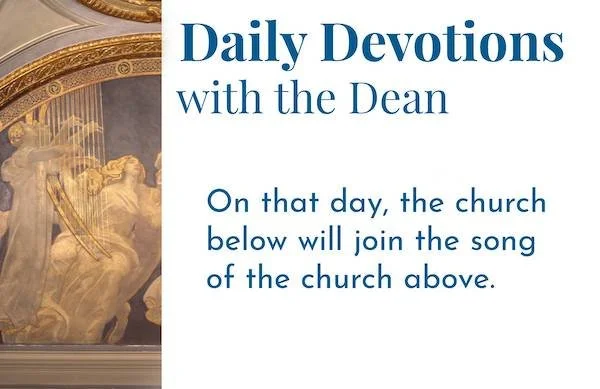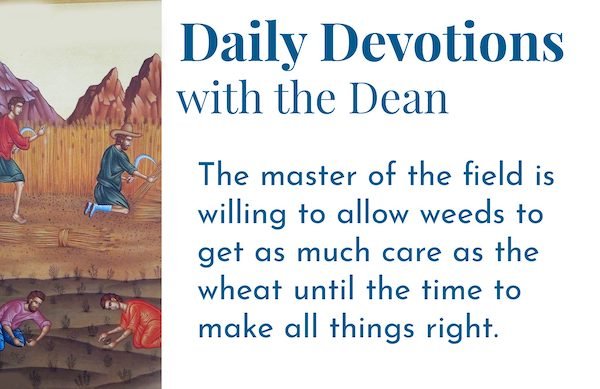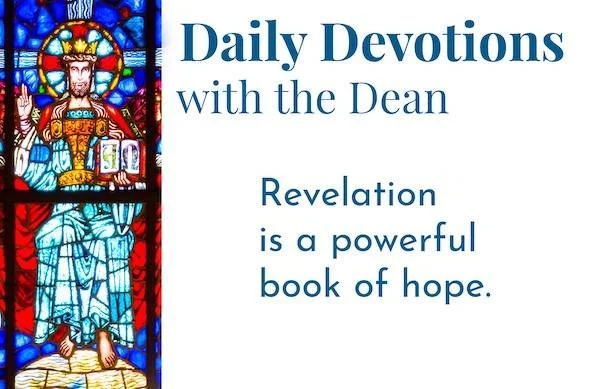Wednesday • 11/15/2023 •
Wednesday of the Twenty-fourth Week After Pentecost (Proper 27)
This morning’s Scriptures are: Psalm 119:97–120; Nehemiah 7:73b-8:18; Revelation 18:21–24; Matthew 15:29-39
This morning’s Canticles are: following the OT reading, Canticle 11 (“The Third Song of Isaiah,” Isaiah 60:1-3,11a,14c,18-19, BCP, p. 87); following the Epistle reading, Canticle 16 (“The Song of Zechariah,” Luke 1:68-79, BCP, p. 92)
Welcome to Daily Office Devotions, where every Monday through Friday we ask how God might direct our lives from that day’s Scripture readings, as given in the Book of Common Prayer. I’m Reggie Kidd, and I’m grateful to be with you. This Wednesday in the Season After Pentecost our readings come from Proper 27 of Year 1 in the Daily Office Lectionary.
Dimensions of worship. The daily lectionary’s three-week-long exploration of reform under Nehemiah as governor and Ezra as priest and scribe closes today with a snapshot of people at worship. Though there are several important features of worship in this passage, I found myself making notes on the reading and interpreting of Scripture in worship (on another occasion, perhaps we can explore other dimensions of worship in this passage, like congregational participation, the nature of historically informed sacred actions, and provision for the needy).
Reading the Word of God. “[T[he priest Ezra brought the law before the assembly … He read from it facing the square before the Water Gate from early morning until midday … and the ears of all the people were attentive to the book of the law” (Nehemiah 8:3b). He may have read for what? four to six hours?!
After Ezra and Nehemiah’s day, the practice of lengthy Scripture reading carried over into Jewish synagogue practice. I love the way the Christian church in second century Rome took their cue from this prioritizing of Scripture reading: “And on the day called Sunday, all who live in cities or in the country gather together to one place, and the memoirs of the apostles or the writings of the prophets are read, as long as time permits…” (Justin Martyr, First Apology 67). There are many ways in which countless churches around the world honor this principle today—they gather to take in the story. However, sadly, many churches, even churches that vigorously defend the authority of the Bible, seldom actually read much of the Bible in worship. I wish churches in the latter camp would reconsider. I love the fact that the Sunday readings in the church I now serve consist of (often quite generous) portions of the Old Testament, the Psalms, the Epistles, and the Gospels … and that we stand for the Gospel.
Interpreting the Word of God. As we are all acutely aware, everything in the Bible is subject to interpretation. It’s never really been as simple as, “The Bible said it, I believe it, that settles it.” Godly and competent and wise interpretation has been necessary from Day One. As Ezra reads, he is flanked by thirteen priests who along with thirteen Levites “helped the people to understand the law, while the people remained in their places. So they read from the book, from the law of God, with interpretation. They gave the sense, so that the people understood the reading” (Nehemiah 8:7b–8).
Again, the early church learned from Jewish practice that preaching and teaching were necessary to explain the text and to help us figure out its meaning for our lives. Here’s Justin Martyr’s explanation of what kind of preaching would follow the reading of the memoirs of the apostles and the prophets in the second century Roman church: “…then, when the reader has ceased, the president verbally instructs, and exhorts to the imitation of these good things” (First Apology 67). The church didn’t gather to take their marching orders from a self-proclaimed policy wonk with a divinity degree, nor from a community organizer with a collar. They didn’t come from far and wide to find secrets to narcissistic self-actualization from a self-help sage with a stole. The ancient church knew, as Ezra and Nehemiah knew, that what people longed for was help to inhabit and orient their lives around the story being told, around the vision being painted, around the song being sung … in the Scripture being read.
Take aways: read and interpret. Our new drama troupe at the Cathedral Church of St Luke recently presented Christopher Marlowe’s The Tragical History of Doctor Faustus. Those familiar with Marlowe’s rendering of the classical Faust story know that in the end Marlowe’s Dr. Faustus’s belief is that God is all power and no love, all justice and no mercy. And so, while Faustus can imagine how “one drop” of Jesus’s blood, even “a half a drop” of his blood could save him, he just.can’t.bring.himself.to.ask! As one character chastises him: “… miserable man, That from thy soul exclud’st the grace of heaven.”
Early in the play, Marlowe offers two factors that contribute to Faustus’s self-damnation.
“Read, read the Scriptures…” Faustus finds enchantment in magic, but he can’t find the enchantment of the story that Scripture tells. A “Good Angel” exhorts him, to no avail, to put away the blasphemous books that enthrall him, and give the Bible a chance to re-engage his imagination. “Read, read the Scriptures … that [book of magic] is blasphemy!” But Faustus has decided he knows everything the Bible could possibly teach him, and is ready to move “beyond” it to magic and necromancy. But as we shall see, he’s only read the Scriptures partially, and badly at that.
Interpret well, or things won’t go well. As he contemplates making a deal with the devil for his soul, Faustus recalls what he’s learned from the Bible. He remembers the first half of Romans 6:23, “The reward of sin is death….” The best he can conclude from this verselet is: “That is hard.” He can’t bring himself to recall the second half of the verse: “…but the free gift of God is eternal life in Christ Jesus our Lord.”
Faustus then recalls 1 John 1:8, “If we say we have no sin, we deceive ourselves, and there’s no truth in us,” from which he infers that the Bible’s message is death and condemnation: “Che serà, serà. What will be shall be? Divinity, adieu!” Once again, Faustus reads only partially, and badly. He forgets that 1 John 1: 8 is the setup to 1 John 1:9, “If we confess our sins, he who is faithful and just will forgive us our sins and cleanse us from all unrighteousness.”
I pray that unlike “accursed Faustus, miserable man,” and instead like the joyfully redeemed children of the generation of Ezra and Nehemiah, like the second century Christians of Rome, and like countless believers around the world today, we read the Scripture and read it well. May we find in God’s Word not confused ideas about God, a disenchanted picture of reality, and condemnation of our souls, but rather a robust view of God, a re-enchanted world, and abundant mercy for our souls through Jesus Christ our Lord.
Be blessed this day,
Reggie Kidd+













